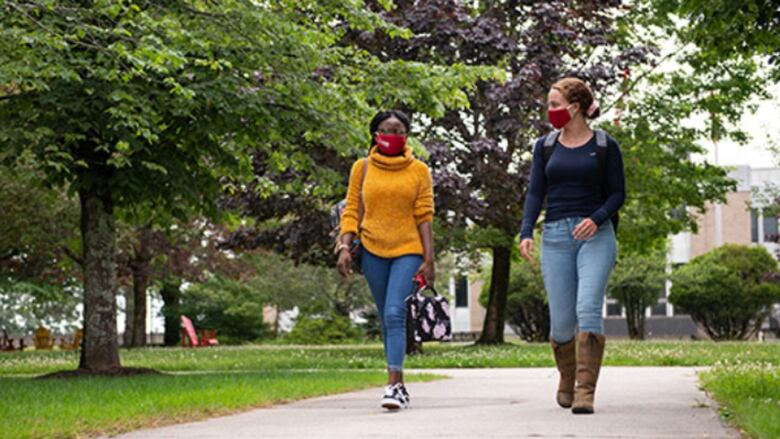UNB to train, pay some students to help peers with mental health struggles
Students would be paid for training and working hours, can help peers navigate health system

Students at the University of New Brunswick and four other universities are being trained with federal money tohelp fellow students with their mental health struggles, the government announced Friday.
MP Jenica Atwinwas at the UNB Fredericton campus to elaborate on the use of $2 million announced earlier.
The three-year campus peer support pilot will be led by the Canadian Mental Health Association and see 100 students hired across the five schools, which also include University of Prince Edward Island, Trent University, Medicine Hat College and University of British Columbia.
Christa Baldwin, the executive director of the Canadian Mental Health Association of New Brunswick, said peer support is emotional and practical support between people who share common experiences.
The students will be trained to share coping strategies, help navigate the mental health system and "can certainly instill hope in people."

She said this is something already done in universities, but training will improve the student's ability to help.
The 100 positions will be distributed to the five universities based on population and need.
61% of students felt mental health decline
Students' mental health has deteriorated in the last two years, as isolation and a global health crisis took a toll on everyone's ability to cope.
According to research done by the Canadian Mental Health Association, 61 per cent of Canadians aged 18 to 24 say their mental health has declined since the beginning of the pandemic.
At UNB in Fredericton, students' mental health challenges were compounded by the loss of the sole psychiatrist at the Student Health Centre in 2020. The psychiatrist was suspended by the College of Physicians and Surgeons after multiple sexual assault complaints from patients. The university and psychiatrist are currently being sued by one of the victims.
There is still no psychiatrist listed on the health centre website.
UNB spokesperson Kelsey Pye said the Student Health Centre has a "referral relationship" with a psychiatrist in the community.
Sydona Chandon, executive director of the New Brunswick Student Alliance, said the alliance is happy to see this program but continues to advocate more services.
St. Thomas University shares counselling and health services with UNB, but it is not part of the peer support program. The Saint John campus of UNB is also part of the peer counselling pilot.
Pye said UNB Fredericton employs 5 full-time counsellors and onefull-time director of counselling, who also counsels students.
UNB Fredericton,NBCC Fredericton and St. Thomas University share a province-fundedLGBTQwellness co-ordinator. The three campuses also share aspecially trainedsexual assault support advocate.
'Part of a whole'
Bonnie Lipton-Bos, the national manager of the Canadian Mental Health Association, said the peer supports would be working alongside counsellors and other service providers.
"They're one part of a whole," she said.
The students who will be hired will be vetted to make sure they're in a place where they feel well and able to take on this work. They would also be offered help as part of the program to maintain their own mental health.
"That's part of becoming a peer supporter," she said. "Understanding self-care strategies, how to take care of yourself, where to set boundaries and how to ask for help yourself."
According to the New Brunswick Health Council,30 per centof New Brunswick youth have perceived mental health needs, but many of those needs go unmet because of stigma, lack ofawareness of resources and long wait times.
In 2019-2020, youth referred for addiction and mental health services waited 58 days from the day their referral was received to the day a clinician was assigned as their caseworker, the council reported in January of this year.
Youth in the Saint John areahave a shorter wait time of 41 days, but youth inMadawaska and the northeast, generally have to waitmore than three months, or 95 days.












_(720p).jpg)


 OFFICIAL HD MUSIC VIDEO.jpg)
.jpg)



























































































